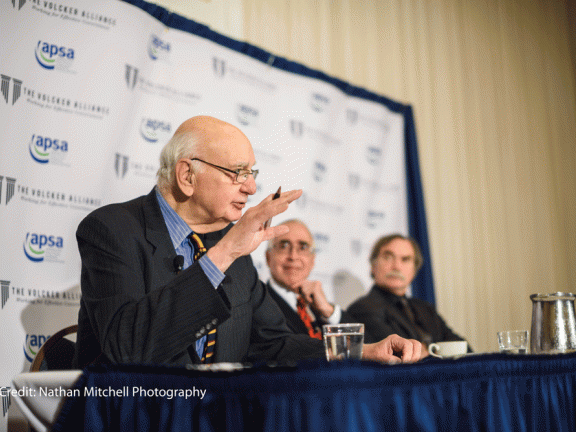Research Shows Growing Number of Federal Government Breakdowns

Paul A. Volcker and Paul C. Light Urge Significant Federal Government Reform to Improve Execution of Public Policy
Research by Professor Light, an APSA awardee and Volcker Alliance adviser, warns of accelerating trend of federal agency breakdowns
December 11, 2015, Washington, D.C. – At a press conference held today at the National Press Club, Paul A. Volcker, former Chairman of the Federal Reserve Board, and Paul C. Light, Paulette Goddard Professor of Public Service at New York University’s Wagner School of Public Service, called upon political leaders, including the 2016 Presidential candidates, to address large-scale reform to improve the delivery of public policy by federal agencies.
Mr. Volcker proclaimed that “a gap between vision and action undermines the government’s ability to execute.” Research by Professor Light released at the event by the Volcker Alliance demonstrates that the number of federal government agency breakdowns has steadily increased over the past 30 years. He predicts that, at the current rate, the federal government under President Obama will set a record for the number of breakdowns in a two-term presidency.
Mr. Volcker, who has led two National Commissions on the Public Service, also noted that he is “frustrated by the slow pace of change in the federal government,” which led to his 2013 launch of the Volcker Alliance, a nonpartisan nonprofit organization that seeks to address the challenge of effective execution of public policies.
“Everyone loves to discuss how big or small government should be,” said Mr. Volcker, “or what its strategy should be to reduce income inequality or defeat ISIS. Those debates are important. Very important. But they’re also irrelevant if we can’t trust that government will actually be able to deliver on its strategic goals and implement the laws of the land. What we need is attention—much more attention—to the ‘nuts and bolts’ of management within the government. Without it, the fate of our great democracy is increasingly precarious.”
Professor Light, who served as an adviser on both National Commissions and is also an adviser to the Volcker Alliance, echoed Mr. Volcker’s frustrations and called for an “integration of vision and action,” adding that “the time for tinkering is over.” Steven Rathgeb Smith, Executive Director of the American Political Science Association, praised Professor Light’s research in remarks introducing him and noted his recent receipt of APSA’s John Gaus Award and Lectureship to honor a lifetime of exemplary scholarship in the joint tradition of political science and public administration.
Mr. Volcker and Professor Light’s proposed solutions include:
- Thinning the layers of the federal bureaucracy,
- Reducing duplication and overlap among agencies, and
- Insisting that policy study and proposals be joined with concerns about effective implementation and management.
Professor Light’s research documents 48 federal agency breakdowns since 2000, ranging from failing to “connect the dots” in identifying the threat of the terrorist attacks of September 11th to the collapse of an interstate-highway bridge in Minnesota to the botched launch of healthcare.gov. His analysis reveals that flawed policy and inadequate resources were accompanied by deficiencies in culture, structure, and leadership. He also notes that second-term presidents face a greater risk that government will produce more breakdowns, and warns that the incoming administration is likely to experience a breakdown within the first six months.
“This is—or should be—a bipartisan issue,” said Professor Light. “These failures are costing the American public a great deal—not only in terms of dollars lost, lives lost, and young people discouraged from working in government, but in the overall regard that Americans have for our democracy. As the latest Pew survey shows, Americans trust their government less and less, yet it is obvious we must rely on government to keep us safe from terrorism, to respond to natural disasters, and to monitor the safety of our food and cars. It’s time for all of us not just to collectively demand better performance from our federal government but also to do what’s necessary to improve its management.”